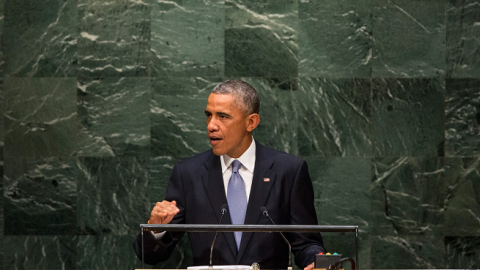Last week was good for environmentalists, and perhaps even for the environment. President Obama doubled down on his effort to increase the likelihood of the success of the 2015 UN climate change conference in Paris, claiming the U.S. has "a special responsibility to lead. That's what great nations do." He took the occasion of the UN meetings in New York to put the heat on China, the world's largest polluter, to match the steps the U.S. is taking to reduce its CO2 emissions. The president is relying on executive orders to by-pass Congress and put in place stricter control of power plant emissions. He must believe that if he has the power to order such reductions without consulting Congress, surely the leaders of the somewhat less democratic Chinese regime can rely on similar fiats. He also believes that if the world's two largest emitters agree on a program to reduce these greenhouse gasses, the third, fourth, and fifth largest polluters will sign on to that program.
Unfortunately:
* China's president Xi Jinping (#1) did not come to New York.
* Prime Minister Narendra Modi of India (#3), although in New York, gave the climate meeting a miss, and his environment minister asked, "What cuts? That's for more developed countries. The moral principle of historic responsibility cannot be washed away."
* Russian president Vladimir Putin (#4) is more interested in developing a plan to step up his challenge to NATO than to scale down his nation's emission.
* Japan (#5), wants to keep open its options to burn more fossil fuels since the nuclear disaster at Fukushima.
Equally unfortunate is the difficulty of agreeing on a common set of facts as the background for a policy debate. There are studies showing that the climate is warming, and others that show it hasn't done so for a couple of decades. There are studies showing that solar and wind power are now competitive with fossil fuels even in the absence of subsidies, and others showing that replacing fossil fuels with greater reliance on renewables that are not available when the wind doesn't blow and the sun doesn't shine can drive up energy costs and reduce a nation's competitiveness, as has happened in Germany, in the end forcing greater reliance on coal than at any time since 2007.
To make matters even more difficult for policymakers, poorer developing countries say climate change has been created by the rich, industrialized countries, and are demanding that the costs of solving the problem be borne by those beneficiaries of the age of fossil fuels. (See statement above by Prakash Javadekar of India.) They want a rather substantial income transfer to developing from developed countries, a long-standing goal only recently tied to the desire to reduce carbon emissions. And they want developed countries to reduce their emissions so that emerging economies can increase theirs without driving the global total to threatening levels. They like to note that the EU has managed to reduce its emissions sharply, ignoring the facts that it did so by presiding over a recession and by importing more and more goods produced in China's heavily emitting manufacturing plants.
The president's renewed drive for a Paris deal was not the only good news for those who believe the reduction of greenhouse gas emissions is imperative if a climate disaster is to be avoided. An estimated 300,000 activists, including former vice president Al Gore and marchers calling for the end of capitalism, the latter tussling with New York's finest for the control of Wall Street, turned out in New York City to support a reduction in emissions. So did the city's mayor, Bill de Blasio. He announced he would reduce New York's emissions by 80 percent by 2050, presumably by putting pressure on real estate developers who need his approval of their construction permits.
The frosting on environmentalists' cake came when the Rockefeller Brothers Fund announced it would divest shares in companies producing fossil fuels. It could not be determined whether John D. Rockefeller, the fund's founder who also founded the modern petroleum industry, is spinning in his grave or, as his heirs contend, would be a leader in the switch to renewables. But it is certain he would have noticed that the family's $2 million investment in renewables was wiped out.
So where is policy likely to go from here? There is no question that emissions targets being bandied about require that 80 percent of the world's reserves of fossil fuels be left in the ground, unused: those targets will not be met. To do so would be uneconomic and would forfeit the geopolitical advantages that fracking has handed the U.S., not least the pressure its newly developed natural gas reserves is putting on the prices Putin can get for Russia's natural gas. But neither is there any doubt that the political pressure to reduce emissions will mount -- believers in the fact of climate change and CO2 as its cause have succeeded in creating concern about global warming.
Nor is there any doubt that the politics of energy use have increased the probability that some sort of deal will be cut in Paris that can be dubbed a success -- from zero into positive territory. Developing nations, accounting for over half of the world's emissions, will have to be placated and China, which accounted for more of the recent increase in CO2 emissions than the rest of the world combined, will have to be convinced that any deal does not interfere with its current struggle to recharge its growth engine. The regime, recognizing that it cannot continue on its present path without seriously reducing livability in its major cities, is experimenting with a cap-and-trade emissions reduction program and, according to Vice Premier Zhang Gaoli, "will make an even greater effort to address climate change and take on international responsibilities."
The good news for Mr. Zhang, and indeed for all those who believe emissions-reductions are essential, was the unveiling of a study contending that if carbon emissions are taxed, and the proceeds used to reduce growth-stifling income taxes, we can have both lower emissions and higher growth rates, a position this writer has long taken, even though not among the true believers in climate change. But neither I, nor anyone else for that matter, can be certain the believers are wrong. So, nodding in their direction, if it includes a pro-growth adjustment to the tax code, would be worth putting on the table in Paris. And, in fact, pursuing it here in America now as a way of helping the U.S. economy while leading others down the path of environmental virtue. That's what the leadership required of a great nation is all about.














